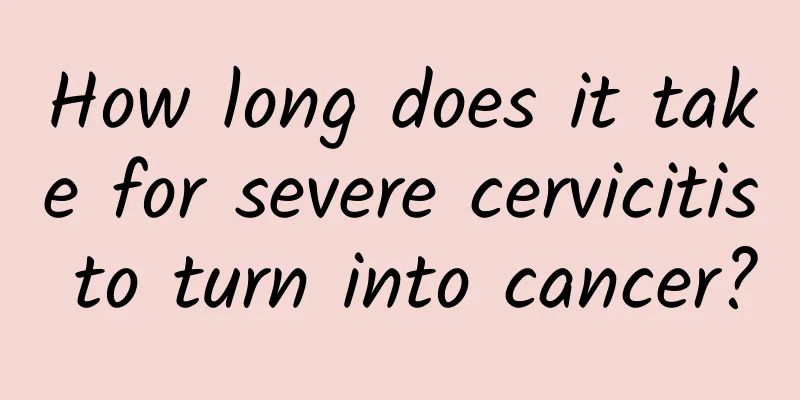What is uterine leiomyoma? Is increased vaginal discharge a uterine leiomyoma?

|
For some women, when is it uterine leiomyoma? Uterine leiomyoma, also known as uterine fibroids, is the most common benign tumor in the female genitalia. It is mainly caused by the proliferation of immature uterine smooth muscle cells. Its symptoms include low back pain, abdominal pain, increased leucorrhea, menstrual changes, anemia, etc. 1. Low back pain and abdominal pain: As the fibroids compress the pelvic organs, blood vessels and nerves, the pelvic congestion, lower abdominal swelling, back pain and menstruation worsen. Acute abdominal pain occurs when the pedicle of the subserosal fibroid is twisted. During pregnancy, the fibroids undergo red degeneration and are accompanied by fever. 2. Increased leucorrhea: Intramural fibroids increase the area of the uterine cavity, increase endometrial gland secretion, and are accompanied by pelvic congestion, leading to increased leucorrhea. If it is a submucosal fibroid, the surface is prone to infection and necrosis, producing a large amount of purulent and bloody secretions, accompanied by a peculiar smell, and sometimes bloody leucorrhea. 3. Menstrual changes: Menstrual changes are common symptoms of uterine fibroids. Small fibroids and subserosal fibroids usually do not have menstrual changes. When fibroids enlarge the uterine cavity, the endometrial area increases, the uterus contracts poorly or the endometrium proliferates too long, or submucosal fibroids may manifest as prolonged menstruation and menorrhagia. Failure to treat them in time may lead to anemia. 4. Anemia: Long-term excessive menstruation leads to secondary anemia. In severe cases, symptoms such as general fatigue, pale complexion, shortness of breath, and palpitations may occur. 5. Abdominal mass: When the mass is large or grows too fast, you can feel the mass in the middle of the lower abdomen and it is hard in texture, especially in the morning when the bladder is full. 6. Abnormal urination: If the fibroids are large or growing, clinical symptoms of squeezing the adjacent pelvic organs may occur. Fibroids on the anterior wall of the uterus compress the bladder, causing frequent urination, urinary retention, etc. Fibroids on the posterior wall of the uterus compress the rectum, causing difficulty in defecation. 7. Infertility and miscarriage: If the fibroids compress the fallopian tubes and twist or deform the uterine cavity, it will hinder the implantation of the fertilized egg and lead to infertility. Huge uterine fibroids can cause deformation of the uterine cavity, hindering the implantation of the fertilized egg and embryo development. |
<<: What are the main symptoms of uterine leiomyoma? What should I do if I have uterine leiomyoma?
>>: What are the symptoms of uterine leiomyoma and the treatment of uterine leiomyoma
Recommend
Early symptoms of incomplete hydatidiform mole
Early symptoms of an incomplete hydatidiform mole...
What medicine can I take to eliminate uterine fibroids?
Regarding the drug treatment of uterine fibroids,...
Cost of treating chronic menopause
How much does menopause cost? This is a question ...
How to replenish nutrition after exercise? Carbohydrate:Protein=2:1
After running hard for half an hour, I finally co...
How much does it cost to induce abortion in Shenyang
With the changes of the times, people's minds...
Bartholin's gland cyst during pregnancy
Treatments for Bartholin's gland cysts during...
Symptoms of uterine fibroids Prevention measures of uterine fibroids
What are the symptoms of uterine fibroids? Uterin...
What to do if an ovarian cyst ruptures
What should I do if my ovarian cyst ruptures? The...
Treatment of Acute Bartholinitis with Integrated Traditional Chinese and Western Medicine
Bartholinitis is an inflammation caused by infect...
How to choose various surgical methods for uterine fibroids
Surgery is a traditional and effective method for...
What are the main diagnostic criteria for vulvar leukoplakia?
Many people do not know about vulvar leukoplakia,...
Does having uterine fibroids cause abdominal pain?
Will I have lower abdominal pain if I have uterin...
What's wrong with abortion stomach pain?
Abdominal pain generally refers to abdominal pain...
Eat more after exercise? Improve basal metabolism without gaining weight
I feel hungrier than usual when I exercise, but m...
How to self-diagnose chocolate cysts
What are the main aspects of self-diagnosis of ch...









